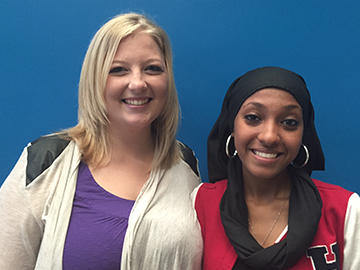
Section Branding
Header Content
Kennesaw State Students Learn History, Significance of the Hijab
Primary Content

Students at Kennesaw State University spent two days last week learning about the history and significance of the Hijab. Students also had the chance to wear the Muslim headscarf.
This was part of the school's Year of Arabian Peninsula program. The initiative aims to cultivate a deeper appreciation for and understanding of the history and cultures in that area through a series of events, lectures and activities.
GPB's Rickey Bevington spoke with Kennesaw students Caitlin Syfrett, who helped lead the event, and Ferdos Hashem, who's the president of Kennesaw's Muslim Student Association.
Rickey Bevington (host, GPB’s “All Things Considered”): What do you want people to get out of this experience?
Caitlin Syfrett (student at Kennesaw State University): I would really like for people to get to know people before judging, and I think that’s a huge problem. I think that’s something that happens with the hijab. People assume things about the hijab and sometimes it’s completely off base. Sometimes really bad things happen because of these judgments, and that’s something that I would love to see go away.
Rickey Bevington: Ferdos, you’re wearing a hijab. Why don’t you describe it and tell me the religious significance?
Ferdos Hashem (student at Kennesaw State University): My hijab is black and it’s tied to the back so my neck is showing, and has a little loop around it. Originally, I started wearing it when I was about 13 or 14. It was encouraged from my father and mother, but I didn’t see the significance in it until I started getting a little older and I started taking it more seriously as I learned more about the text and the religion and what not. It’s basically more about modesty, and as a protection for a woman, and it is supposed to be a choice as in anything you do. Religiously, it’s supposed to be for yourself and for God. If it’s for any other reason besides that, then it’s basically just not right.
Rickey Bevington: What has been your experience wearing the hijab?
Ferdos Hashem: My experience overall has been pleasant in the sense that I haven’t gotten anything too out of hand or like too confrontational. But at the same time it is hard to walk into a room and not feeling like you’re the center of attention, especially if you’re like the only one. It’s also hard when it comes to jobs sometimes because when you’re going for an interview this is not something that I can just take off. It’s not like a once in a day type thing. So, automatically someone will have a first impression of you just because you have it on. So, I have to kind of like show them that I have a personality. I have so much more about me than just this cloth on my head.
Rickey Bevington: Caitlin, what was your experience wearing the hijab?
Caitlin Syfrett: Surprisingly neutral. I didn’t get any negative feedback from people on campus. So, it was a very good experience. I had a lot of strangers actually come up to me and say, ‘Oh, I love your scarf. I love your hijab.’ So, it was very positive, and nothing really negative came out of it.
Rickey Bevington: Is that what you expected?
Caitlin Syfrett: It’s what I hoped for. I didn’t know what to expect. So, it’s definitely what I hoped for and that just means that people either didn’t want to be rude directly or they just didn’t think anything of it. They accepted it. So, that was good.
Rickey Bevington: Ferdos, from your perspective as someone who wears a hijab every day, what was it like for you to see other women participating in this?
Ferdos Hashem: It was very, very pleasant. I was happy with it because you can’t really know what someone goes through until you’ve walked in their shoes. So, that’s like the only way where you’re like, ‘Ok, I know how you feel.’ So, for some of the girls to wear it, it was just like, ‘Ok, you see what I see now.’ So, it was very nice. I enjoyed it.
Rickey Bevington: Thank you very much for joining me.
Ferdos Hashem: Thank you.
Caitlin Syfrett: Thank you.
Tags: kennesaw state university, year of the arabian penninsula, hijab, hijab for a day, Caitlin Syfrett, Ferdos Hashem
